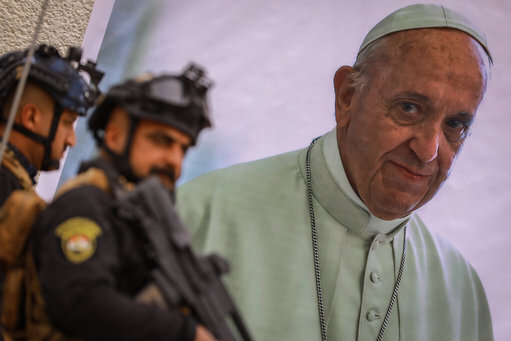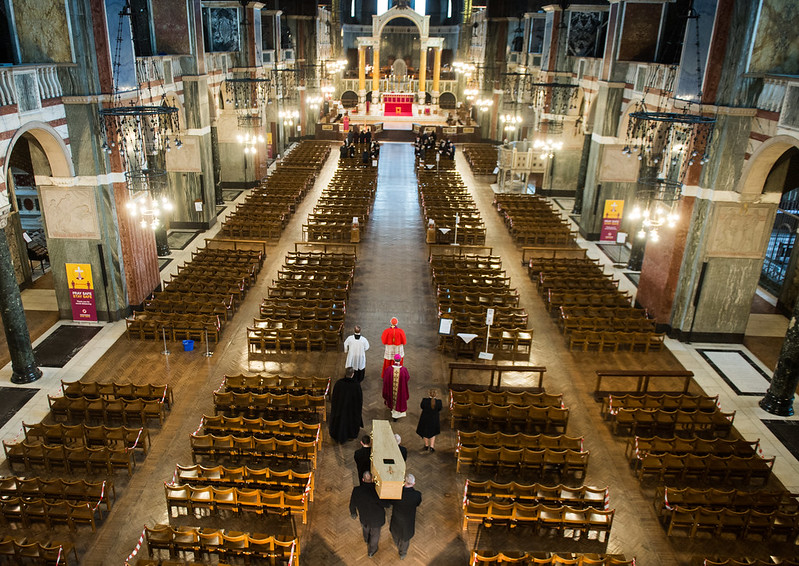Celebrating Mass together has been perhaps the central Catholic act for millennia. It is the sacrament Catholics participate in most often, and a central way that Catholics re-affirm their relationship with God. But it is also key to how the Church asserts itself as a community. Regular Mass – on Sundays, at Easter, on Christmas, or throughout the liturgical calendar – is how Catholics mark time, build identity, and keep faith alive. Whatever the specifics of their beliefs, Catholics are sustained by coming together as a community.
Individual church communities are where the local and the universal belonging of Catholics is realised through communal worship and sacraments. The strength of the global Catholic communities is rooted in the resilience of local and trans-local ties and fellowship. The pandemic has put that resilience and sense of belonging to the test but it has also afforded some unexpected opportunities for outreach and inclusion. How then does community manifest itself when we cannot be physically together?
Many things have been lost when people cannot worship together. Individual churches have sometimes been met with the reality of navigating between theological and doctrinal prescriptions and the needs of their parishioners. The Eucharist, it is often argued, requires physical co-presence for the consecration of the host, but can such co-presence be mediated through digital connections and the intimacy of people’s domestic spaces. Is taking communion remotely possible or should the focus be on the spiritual communion instead? The pandemic has also made impossible many other ritual and social gestures that imbue Catholic congregations with the affective and spiritual strength. The simple joys of sharing Christ’s peace, of a friendly chat, and of sharing fellowship are much, much harder than they used to be. A hug during a funeral service or a gentle squeeze on the shoulder can make an overwhelming sensation of loss during a funeral service more bearable. Sadly, most of us have had experiences of an online funeral during this pandemic. Many of those experiences have felt hollow and frustrating, even as we felt how much we needed the comfort that came from the ability to properly bury the dead and console the grieving.
The pandemic has only heightened our need for the sense of continuity and meaning that communal rituals can provide. In all aspects of our life, the pandemic has forced us into ways of being with one another, for most of us, are new and awkward. We are getting better at them, whether we like it or not, and those same skills are being applied to our ritual lives. We have found ways to adapt our religious lives to the conditions of the pandemic. We have eliminated most, but not all, technical glitches. Priests have learned how to conduct Mass in-person safely with appropriate safeguards and social distancing, and developed new ways of enabling participation remotely.
But how effective are these adaptations? Does socially distanced and online worship do the same job that traditional worship does? Does an online funeral feel like a ‘real’ funeral? And what happens to that feeling of belonging and spiritual community that comes from worshipping together when we have to socially distance?
To answer some of these questions, I am leading on a research project that is seeking answers to these questions. We are conducting a large-scale survey of people of all faiths across the UK about their ritual lives during the pandemic. We’re also interviewing people across the country, observing all the ritual life we can, and working with religious professionals and lay people closely to put our findings into practical use.
This is a self-consciously inter-religious project. We’re looking into as many different sorts of British religious practice not just for the sake of it, but because different faith groups will find different ways of addressing the Covid-19 situation that we’re all facing together. No two faiths are the same, and each religion has its own rules and understandings that shape what makes a ritual authentic, meaningful and effective. But it’s been my experience that, especially in times of crisis, religious leaders of different faiths can learn more than we might think from one another. We are all facing the same fears right now: illness, uncertainty, death, and loneliness. Though each faith will address them differently, they are addressing similar needs in similar contexts. We want to learn from Catholic communities across the UK and help to share that wisdom with Britons of all faiths and none.
In our survey, we are asking both religious leaders and congregants to tell us about their experiences of weekly Mass, of holiday celebrations, and life-cycle rituals. However often or seldom you attend church, we want to hear from you. We invite all members of the British Catholic community to share their experiences with us at http://bric19.mmu.ac.uk.
Very little in our current society will survive the pandemic unchanged. The legacy of this time is likely to be felt for decades. Religious life will not be exempt from this. Already, we’ve found from our survey that the vast majority of clergy say that they will use some of the new techniques that they’ve learned during the pandemic once this is all over. Really, how could they not? What we’ve learned and experienced during this difficult year will stay with us for the rest of our lives. The experience of the sacraments and the spiritual nourishment they provide have sustained Catholic communities through pandemics and wars and crises before, and they can see them through this one as well. But how they will do so, and the effects these changes will have, demands further investigation.
Dr Joshua Edelman is Senior Lecturer at Manchester Metropolitan University and lead researcher on the Social Distance, Digital Congregation: British Ritual Innovation under COVID-19 research project.
Dr Paulina Kolata is Research Associate at Manchester Metropolitan University.



 Loading ...
Loading ...
What do you think?
You can post as a subscriber user ...
User comments (0)